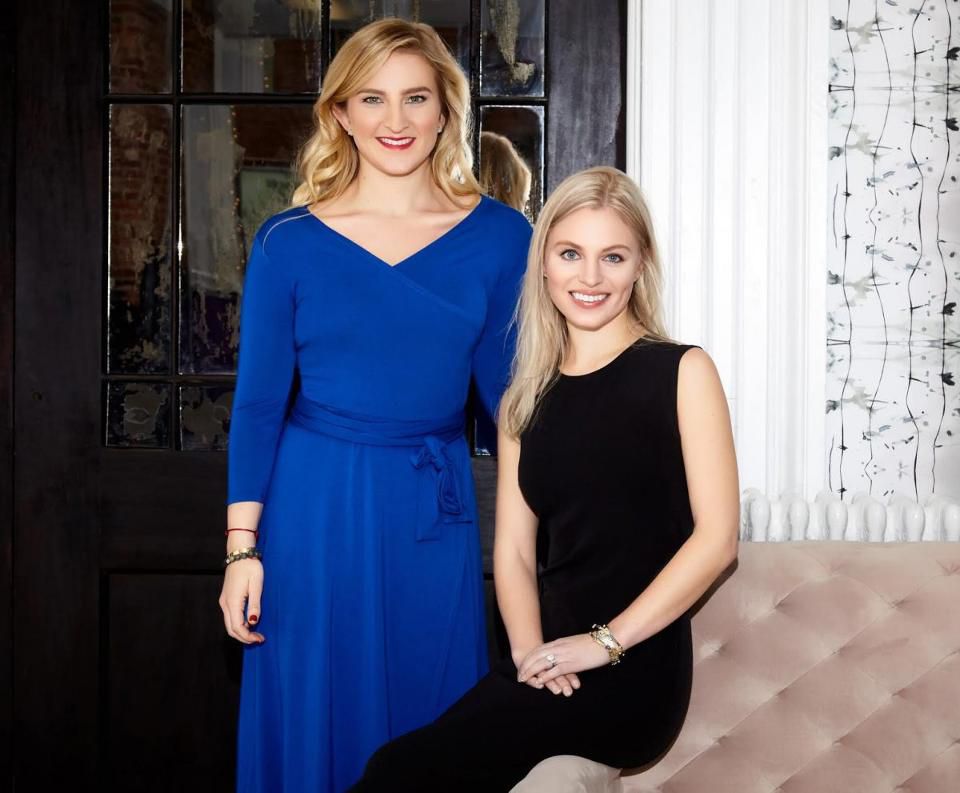When Dorie Golkin Smith and Emelyn Northway met at a networking event at Wharton Business School, they bonded over the fact that they were wearing the same exact dress. They discussed their difficulty finding stylish work clothes at an affordable price and started to work on the concept with the feedback of their female classmates.
Shortly after graduation, Smith and Northway founded their professional workwear company, Of Mercer. The friends have continued to make business decisions based on their needs and listening to their customers (and would-be customers). They designed their plus-size line after women asked for extended sizes and created their new maternity line when women asked for help finding stylish and functional maternity clothes. We spoke about their career advice, how they created a solution for professional women, and whether it’s possible for founders to take maternity leave.

What inspired you to start Of Mercer? What was your career path?
Dorie Golkin Smith: Of Mercer started out of a personal need, so I guess it was kind of selfish! Both of us came from conservative business backgrounds: I was in strategy consulting and [Northway] was in finance, so we had to wear business formal clothes every day, and we were disappointed with the offerings on the market. We were forced to choose between low-quality, mass-market brands, and overpriced designer brands. We knew there had to be a way to make chic workwear in New York that could seamlessly transition women through their hectic days. We started working on the concept for Of Mercer while we were at Wharton Business School, where we had a cohort of 900 professional women to help us validate and develop the idea. We launched the company a few months after graduation.
What has been the biggest challenge and, on the flip side, the biggest reward of starting Of Mercer?
Emelyn Northway: The biggest challenge in starting Of Mercer was diving headfirst into an industry that we knew very little about. There was definitely a steep learning curve in getting up to speed on everything from production to merchandising to building a website. One of the best and worst things about starting a business is that the learning never stops. While four years ago the challenge was product development, today it is understanding and negotiating store leases. Every day we are basically starting from scratch on something new!
One of the best rewards is getting to see the direct results of our hard work. In our previous jobs, we were often providing recommendations to clients and companies, but not getting to see them through. With Of Mercer, we can concept a marketing campaign one week and see results and gauge performance of it the next. But by far the biggest reward is seeing the satisfaction and empowerment that our clothes bring the women who wear them. That’s why it’s important for us to still spend time in our stores and hosting events – we love getting to meet our customers.
What advice do you have for other women who hope to start their own businesses?
Dorie Golkin Smith: Make sure that you start a company that does something that you’re passionate about. There are some days that feel like a struggle, and the only thing that gets me through is hearing from customers about how we outfitted them for an important interview or a huge presentation. If I were making widgets, I’m not sure what would get me through the difficult days.
Gross: What is a workday like? Please walk me through a day!
Emelyn Northway: Any given day of the week can be completely different, but it usually starts off by making sure our customers are happy and orders are being properly taken care of across our warehouses and stores, which usually means answering a lot of emails! The rest of the day is usually jumping between meetings. We’ll go from a fitting in the garment district to a meeting with the contractor in Soho to make sure the renovation work for our new store is on track. In the middle, I might have to call our developer to fix a bug in the website or provide feedback to our copywriting team on a draft marketing campaign. At some point each day, we touch every part of the business.
What are your responsibilities as co-founder of Of Mercer?
Emelyn Northway: The short answer is pretty much everything! Both of us share in all of the strategic decisions like new product development, hiring, branding, and general customer service. But day-to-day, [Smith] focuses on production and product development (a lot of the behind-the-scenes tasks), and I tend to focus on marketing and web experiences (a lot of the customer-experience tasks).
Congratulations on launching the maternity line (and being a soon-to-be mom as well). What inspired you to create the collection?
Dorie Golkin Smith: Over the years we have had pregnant women and new moms reach out to us for outfit help. At first, they are looking to hide their bumps, then they are looking to embrace their bumps, and finally, they are managing their changed post-partum bodies and potentially nursing or pumping while at work. We had a selection of pieces that worked well for bumps, and some that worked for nursing, but none that really covered all of a woman’s needs from the moment she finds out she’s pregnant.
Do you think it’s possible to take maternity leave as an entrepreneur?
Dorie Golkin Smith: I think maternity leave for entrepreneurs is not only possible, it’s necessary! There has been so much research that shows the benefits of paid parental leave – for children, parents, companies, and society as a whole – and there is no reason entrepreneurs are any different. As a founder, I also think it’s important for me to take leave to build the right company culture and set the stage for future mothers and fathers to take a healthy period of time with their children. As a cofounder of a small company, my biggest fear is putting too much work on the rest of my team, but I’ve been prepping for leave for months now, so hopefully, everything is well situated for me to be gone for a bit.
What’s the biggest lesson you learned at work and how did you learn it?
Emelyn Northway: Sometimes done is better than perfect. We both came from careers where attention to detail and perfect formatting were highly important and rewarded. While these skillsets have come in handy when it comes to our product, branding, and customer experience (areas in which we always strive for perfection), we’ve had to learn that we can’t apply this expectation to everything we touch. As a startup owner, especially one with a mindset towards analytics and testing, I often wish I could do just a little more research or one additional analysis, but I’ve learned to prioritize and accept that there are only so many hours in a day.
What is one thing that you wish you had known when you were starting out your career?
Dorie Golkin Smith: For many years, the idea of networking seemed superficial and manufactured to me. I felt compelled to hand out my business card to people I had talked to for five minutes at a cocktail event, and then completely forgot who they were the next week when I was cleaning out my purse and found their business cards. But what I’ve realized over the years is that networking is about quality over quantity – the important thing is building meaningful and lasting relationships. That means the lines between professional and personal connections are not crystal clear, and over time I have come to understand and even appreciate that.
What is the best advice you’ve ever received?
Emelyn Northway: No one else knows what they are doing either. As an entrepreneur, there is a lot of pressure to project confidence in everything you are doing. And for a long time, it stressed me out because I felt as though everyone knew more than I did! But the truth is, most of what you do on a daily basis as an entrepreneur is new, so of course you aren’t going to know exactly what you are doing a lot of the time! Every startup and every job has its challenges, and only by talking openly about them, can you work through them. It’s really helpful advice for fostering the right culture too – you want to make sure everyone from your sales associate to your marketing director feels comfortable enough to alert you to issues or ask for help when they need it.
What is your business advice for other young professional women?
Dorie Golkin Smith: It’s so tempting for many of us type-A planners to think 10 steps ahead and map out the next 30 years of our careers. In my experience that is not only an unnecessary stressor but also a waste of time. The coolest opportunities that you’ll have in 30 years probably don’t even exist right now, so you’re definitely not considering them in your plan. Heck, maybe you’ll be running a company from Mars! Make the best decision each step of the way, and your career will take its natural path, though not the one that you necessarily planned. If you had told me while I was majoring in Civil Engineering at Princeton University that I would be running a fashion company, I would have laughed in your face, but I couldn’t be more excited about where I ended up!































